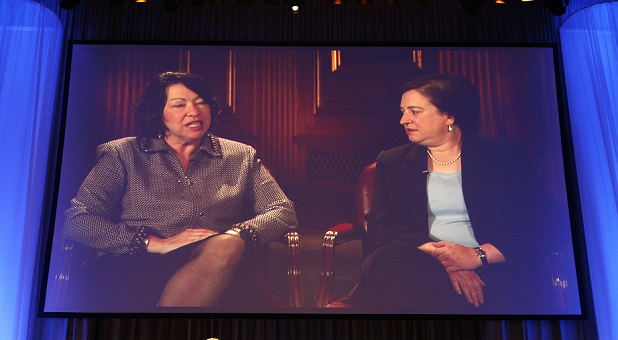Is It Time to Impeach Supreme Court Justices?
When a Supreme Court is reckless enough to redefine a 5,000-year-old institution like the family, which predates government and all written history, is it time to impeach the justices? More and more Americans say it is. Congressman Steve King, R-IA, was asked that question this week when he appeared on the Jan Mickelson Show, a conservative Iowa radio talk show. “That provision does exist, and let’s hear what the public has to say,” he said. Justices Ruth Bader Ginsburg and Elena Kagan had performed same-sex “weddings” before deciding the Obergefell v. Hodges case, claiming there is a heretofore undiscovered Constitutional “right” to gay “marriage.” Legal experts said that called into question whether they were neutral parties who had not prejudged the case and that they had a moral obligation to recuse themselves from the case. The Foundation for Moral Law, founded by Judge Roy Moore, filed a motion for the justices’ recusal, but they did not comply. Had they stepped aside, the case would have been decided 4-3 in favor of traditional marriage. Should they be impeached? King said that’s a political question, and “I don’t know if the public is ready for that.” Still, the option exists. When he ran for president in 2012, Newt Gingrich proposed impeaching activist judges. More recently, Sen. Ted Cruz, R-TX, has said that federal judges and Supreme Court justices should face elections at regular intervals to retain their seats. “This week’s opinions are but the latest in a long line of judicial assaults on our Constitution and the common-sense values that have made America great,” he wrote in a National Review article. “In order to provide the people themselves with a constitutional remedy to the problem of judicial activism and the means for throwing off judicial tyrants, I am proposing an amendment to the United States Constitution that would subject the justices of the Supreme Court to periodic judicial-retention elections. Every justice, beginning with the second national election after his or her appointment, will answer to the American people and the states in a retention election every eight years.“ If the judge lost both an overall majority of votes and the majority of votes in 25 states or more, he – or she – would not be able to serve on the Supreme Court in the future. While this would be a radical departure from the court as envisioned by our Founding Fathers, so is every other aspect of today’s Court. It disregards the Constitution, the intent of the Framers, and its own precedent. Increasingly, justices cite foreign law in their cases. And an increasing number of jurists believe they are a law unto themselves, creating law safely outside the reach of the American voter. Do you think it is time for such a radical change?
















































